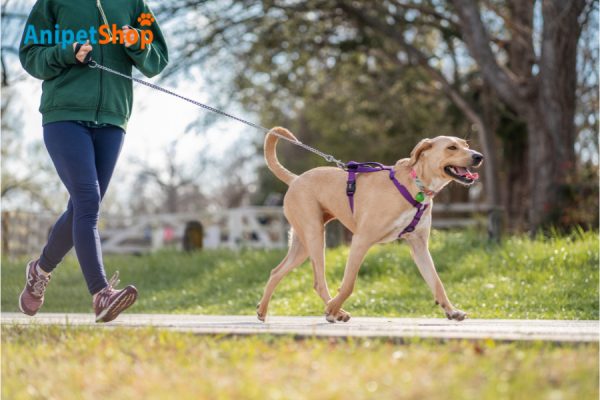9 Natural Ways to Improve Your Dogs’ Immune System
As a pet owner, we want our furry friends to stay healthy. It’s of vital importance to maintain a strong immune system that not only helps prevent common illnesses but also enhances your dog’s energy levels and longevity. While there are many ways to support your dog’s immune health, natural methods are often preferred for their gentle and holistic approach. This post will delve into several natural ways to improve your dog’s immune system, ensuring they stay happy, healthy, and full of life. From diet and exercise to supplements and lifestyle changes, these strategies will help you provide the best care for your furry friend.

Eat Nutritiously
Feeding your dog a nutritious diet is essential for maintaining their overall health and well-being. Notably, a dog’s gastrointestinal tract plays a crucial role in their immune system, comprising approximately 70% of its functionality. To support this vital aspect of their health, it’s important to include foods that promote a healthy gut. It’s advisable to feed your dogs with a balanced and nutritious diet, ensuring they can receive enough necessary vitamins, minerals, and antioxidants to maintain optimal immune function. Some nutritious foods that are good for dogs’ immune systems include
- Apples
- Carrots
- Sweet potatoes
- Pumpkin
- Berries
- Celery
- Bell pepper
- Broccoli
- Bananas
Select a premium dog food brand to ensure that the main ingredient is good for your dogs. It’s advisable to follow the recommended portion sizes tailored to your dog’s breed, size, and activity level and consult with your veterinarian or a veterinary nutritionist to develop an appropriate feeding plan. Remember that providing fresh, clean water is the key to keeping your dog hydrated and supporting its overall health.
Exercise and play
Exercise is good for people, and it does wonders for furry companions, too! Exercise and play are vital for a dog’s immune system, promoting overall health and well-being. Regular physical activity helps maintain a healthy weight, reducing the risk of obesity-related diseases, which can compromise immune function. Play and exercise stimulate circulation, ensuring the efficient distribution of nutrients and immune cells throughout the body. They also help manage stress, which is known to weaken the immune system.
Therefore, it’s recommended to go for a nice walk, grab some toys, and spend 15 minutes playing with your puppy each day. One thing to keep in mind about toys is that they can easily attract bacteria and germs. Regular washing will help prevent the buildup of harmful bacteria.

Weight Management
Weight management is crucial for maintaining a dog’s immune system because excess weight can lead to various health issues that compromise immunity. Overweight dogs are more susceptible to conditions such as diabetes, heart disease, and joint problems, which can weaken their overall health and make them more prone to infections. The easiest approach to managing dogs’ weight is monitoring their food intake and controlling their treat consumption. Consider selecting small pieces of fruits or vegetables, or choose low-calorie treats specifically formulated for weight management. Blueberries or carrots are nutritious foods that boost the immune systems of dogs.
Regular Baths
Regular baths play a crucial role in maintaining a dog’s immune system by promoting overall skin health and hygiene. Clean skin and fur help to prevent the buildup of dirt, allergens, and harmful bacteria that can cause infections and irritations. It’s advisable to bath your dogs every 2-3 weeks, depending on the weather and the dog’s lifestyle. You also need to avoid over-bathing, as it strips the natural oils from the skin, leading to dryness and irritation.

Less Stress
Stress has a negative effect on dogs’ health, especially bad for the immune system because chronic stress can suppress immune function, making dogs more susceptible to illnesses and infections. A calm and relaxed dog is more likely to have a robust immune response, better digestion, and overall improved health.
Here are some activities to reduce stress in dogs.
- Provide dogs with a safe and comfortable environment
- Reassure by regularly interacting with your dogs.
- Stick to routines
- Introduce new people and animals slowly
Clean Toys and Bowls
Dogs interact with their toys and bowls daily, often transferring bacteria and germs onto these surfaces. Therefore, cleaning toys and bowls regularly is crucial for maintaining a dog’s immune system and overall health.
Remember that different types of toys may require specific cleaning methods. For this reason, read the instructions on the label carefully to make sure you clean the toys properly without causing any damage. Most toys can be effectively cleaned using mild dish soap or a mixture of water and vinegar. Furthermore, you should regularly inspect the dog’s toys and discard any worn or damaged beyond repair. This simple yet essential practice helps ensure that dogs remain healthy, happy, and free from unnecessary health issues related to poor hygiene.

Have A Change of Scenery
Dogs, like humans, benefit from exposure to new environments, which can strengthen their resilience and prevent them from becoming overly sensitive or fearful. Dogs are exposed to different sights, sounds, and scents in new locations, stimulating their senses and improving their mental health. Additionally, the mental stimulation of exploring new surroundings helps reduce stress levels, supporting overall immune function. Taking the dog for walks in various settings such as parks, beaches, or urban areas regularly. The change of new scenery not only provides physical exercise but also enriches their lives, leading to a more robust immune system and improved well-being in the long run.
Harness the Healing Power of Dog Massage
It’s proven that harnessing dog massage’s healing power is vital to enhancing a dog’s immune system. According to a 2014 research, massage may improve the immune systems of humans, but our dogs may benefit from it as well. Regular massage can stimulate circulation, which helps in distributing essential nutrients and oxygen throughout the body. Additionally, massage reduces stress and promotes relaxation, which can lower cortisol levels and contribute to a stronger immune response.

Consider Certain Probiotics and Supplements For Your Dog
Sometimes, adding some supplements to your dog’s diet is a good way to enhance his/her immune system. Supplements provide support for immune function, joint health, and cardiovascular resilience, contributing to a happier and healthier life for your furry companion. For safety, remember that dogs need much smaller dosages than humans. Consulting with a veterinarian can help tailor a supplement regimen that meets your dog’s specific needs and ensures optimal health outcomes.
Here are some supplements you can add to your dog’s diet.
- Probiotics
- Omega-3 fatty acids
- Vitamins
- Fish oil
- Digestive Enzymes
- Protein
How Dog’s Immune System works
A dog’s immune system functions as a complex defense network designed to protect against harmful pathogens and maintain overall health. The immune system includes various cells, tissues, and organs that collectively protect the dog’s body from diseases and infections. When a dog encounters a foreign invader, such as bacteria, viruses, or parasites, the immune system responds by identifying and neutralizing these threats. This process involves the production of specific antibodies that bind to the pathogens, marking them for destruction by immune cells. Additionally, the immune system has memory cells that enable quicker and more effective responses upon subsequent exposures to the same pathogens, contributing to the dog’s ability to fight off infections and maintain optimal health.

What Causes a Weak Immune System in Dogs
It’s important to prevent many factors that weaken a dog’s immune system. Here are some common causes that make dogs’ immune systems weaken.
- Age: As dogs age, their immune systems may weaken naturally, leading to decreased effectiveness in fighting off infections and diseases. Older dogs may also experience slower wound healing and increased susceptibility to illnesses.
- Common allergies: Allergies in dogs can compromise their immune systems by triggering inflammatory responses that divert immune resources away from fighting actual pathogens. This can make them more vulnerable to infections and other health issues.
- Excess stress: Stress, whether due to environmental changes, separation anxiety, or other factors, can weaken a dog’s immune system. Chronic stress can lead to elevated cortisol levels, suppressing immune function and making the dog more susceptible to illnesses.
- Medication: After long-term use, certain medications can suppress the immune system in dogs. This suppression can leave them more vulnerable to infections and require careful management by veterinarians.
- Poor diet: A diet lacking essential nutrients can compromise a dog’s immune system. Essential vitamins, minerals, and proteins are necessary for optimal immune function. A diet deficient in these nutrients can lead to weakened immune responses and increased susceptibility to infections and illnesses.
Understanding these factors and addressing them through appropriate care, nutrition, and management can help maintain and strengthen a dog’s immune system, promoting overall health and well-being.
Signs of Weak Immune System in Dogs
Here are some signs of a weak immune system in dogs that the pet’s parents need to consider in order to have a timely approach to ensure the dog always stays healthy.
- Itchy skin
- Joint pain
- Loss of appetite
- Vomiting
- Slow wound healing
- Respiratory problems
- Fever
- Diarrhea

In conclusion, incorporating these natural methods into your dog’s routine can significantly boost their immune system and overall well-being. Whether through a balanced diet, regular exercise, or supplements, each approach plays a crucial role in supporting their health. As a reputable pet store, Anipet Shop offers a range of high-quality products designed to enhance immune function and promote longevity. Visit the Anipet Shop website to discover more products that help your furry companion thrive naturally and happily.
Lily Watson is an author specializing in veterinary care in Australia. With a profound passion for animal welfare and a solid foundation in veterinary science, Lily has dedicated herself to disseminating valuable knowledge and information for both pet owners and professionals in this field.

